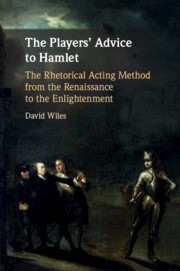 The Players' Advice to Hamlet
The Players' Advice to Hamlet Published online by Cambridge University Press: 16 January 2020
Pre-modern acting theory was framed around emotion, not character, and in this chapter I explore what ‘emotion’ is. There is growing recognition today that emotions have a history, and neurology has suggested new ways of thinking about the mind–body connection. The assumption that humankind has distinct fundamental emotions remains a widely held position today. Passions and emotions: the question of terminology: in addition to the distinction between passions and emotions, I interrogate notions of mind and soul, complicated by questions of translation. Early Modern England: Hamlet seen through the lens of the contemporary Jesuit Thomas Wright, who negotiated competing theories of emotion. The Cartesian turn: I consider Mondory as a pre-Cartesian actor, and the fundamental influence of Charles Le Brun on acting as well as paining. David Hume and English acting theory in the Enlightenment: the multiplication and refinement of emotions as reflected in the theories of Aaron Hill. Two examples of playing the passions: Lekain’s Herod and Nossiter’s Juliet: I draw on Lekain’s manuscript notes and on Morgan’s account of Nossiter’s performance. Rousseau and the ideal of emotional authenticity: Rousseau’s Pygmalion attempted to reconcile the needs of rhetorical delivery with a new sense of emotional truth.
To save this book to your Kindle, first ensure no-reply@cambridge.org is added to your Approved Personal Document E-mail List under your Personal Document Settings on the Manage Your Content and Devices page of your Amazon account. Then enter the ‘name’ part of your Kindle email address below. Find out more about saving to your Kindle.
Note you can select to save to either the @free.kindle.com or @kindle.com variations. ‘@free.kindle.com’ emails are free but can only be saved to your device when it is connected to wi-fi. ‘@kindle.com’ emails can be delivered even when you are not connected to wi-fi, but note that service fees apply.
Find out more about the Kindle Personal Document Service.
To save content items to your account, please confirm that you agree to abide by our usage policies. If this is the first time you use this feature, you will be asked to authorise Cambridge Core to connect with your account. Find out more about saving content to Dropbox.
To save content items to your account, please confirm that you agree to abide by our usage policies. If this is the first time you use this feature, you will be asked to authorise Cambridge Core to connect with your account. Find out more about saving content to Google Drive.